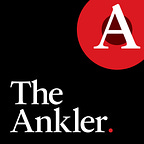Welcome to our newest episode in the special Ankler Hot Seat series about the Sundance Film Festival past and present. In 2017, Ankler Hot Seat hosts Janice Min and Tatiana Siegel both attended the Sundance Film Festival, which, that year, took on a distinctly different mood. Newly-elected Donald Trump was inaugurated as president during the festival, and the mood was tense, as politics and women’s rights overshadowed the regular programming. During his campaign, Trump had derided accusers who had come forth with sexual assault claims, viciously attacked his rival Hillary Clinton, and insulted many prominent women including Rosie O’Donnell and Megan Kelly. One month before the election, Trump’s infamous Access Hollywood tapes leaked out, and many women boiled over. At Sundance, Kristen Stewart, Anna Taylor-Joy, Charlize Theron and Chelsea Handler (plus John Legend and Nick Offerman) marched down Main Street in protest.
Harvey Weinstein also marched — or rather was driven down —to show his support on Main Street. His action was thick with irony. Later that year, Rose McGowan would reveal that he had raped her in a hot tub at the Sundance Film Festival years earlier, and with her voice, she joined a chorus of other accusers as a wall of silence broke around Weinstein, and the #MeToo movement was born. By May 2018, Weinstein had turned himself in to be arrested on charges of rape and sexual assault. Within months, not only would a series of prominent men in Hollywood and media be exposed for rape and sexual assault, but women — for the first time — saw something shift in the entertainment job market that actually began to resemble progress.
In this episode, Min and Siegel discuss the decades-long frustrations that led to the march, with Trump serving as a catalyst, why things actually began to change after that, and how the 2017 festival will go down as one of the major inflection points in the story of women in Hollywood.
Also on The Ankler:
Ankler Hot Seat Podcast: Sundance Cinderella Stories As a slew of independent filmmakers make headlines at the 2022 installment of the festival, directors Jesse Moss of Boys State and Liz W. Garcia of The Lifeguard revisit their dramatic backstories from that took them from unknown to acclaim in one stressed-out week.
A few weeks before the Netflix subscriber miss, and a precipitous stock tumble, our own Entertainment Strategy Guy delivered four charts illustrating how Netflix’s woes were right around the corner in Streaming’s Winner-Take-All Theory Collapses. More recently, ESG weighed in on The Worst Case Scenario for Disney, now facing many of the same downward pressures afflicting its rival. In his column, ESG predicts how the next decade for Disney (and possibly all the streamers) could look very very different from the 2010s.
Yes, Woody Allen gets a film release in China, while no other American filmmakers seem to these days. In Hollywood’s China Grovel is Failing, writer Sonny Bunch dives into the absolute mess stemming from the studios’ decades of capitulation to the Chinese government.
If you are interested in advertising on The Ankler, please contact Kymber Allen at kymber@anklermedia.com.
Can’t afford The Ankler right now? If you’re an assistant, student, or getting your foot in the door of this industry, and want help navigating the craziness of this business but don’t have the money to spare right now, drop me a line at richard@theankler.com and we’ll work it out. No mogul or mogul-to-be left behind here at The Ankler.
The Ankler is Hollywood’s favorite secret newsletter, an independent voice holding the industry’s feet to the fire. If you’re a subscriber, feel free to share this edition with a friend but just a couple, please. The Ankler depends on its paid subscribers to keep publishing.
If you’ve been passed along this issue, take the hint and get on the train. Find out why the New York Times called us the “hit Hollywood newsletter.”
















